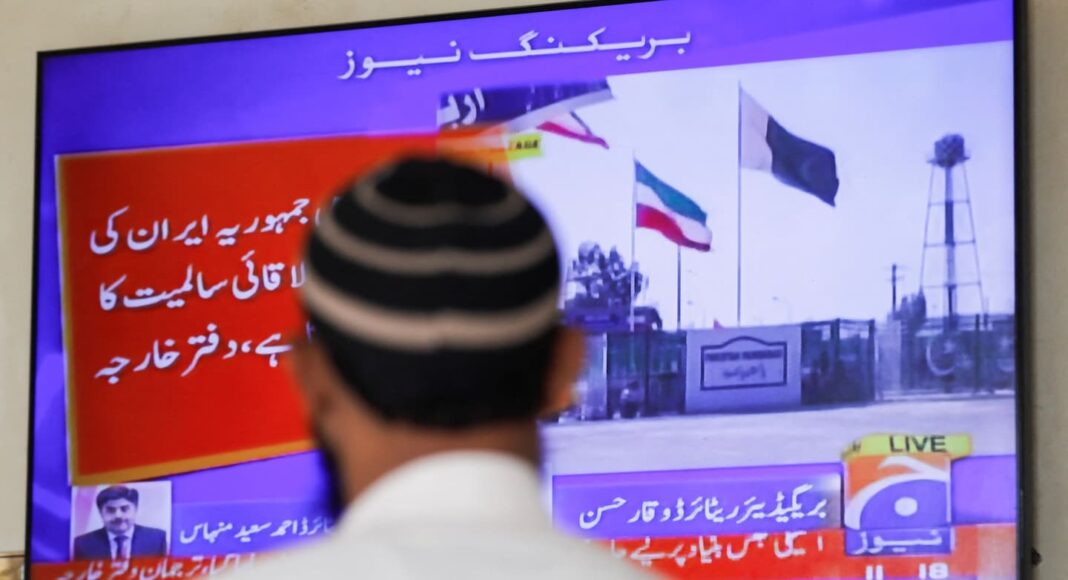Ειδήσεις Ελλάδα
Comment on this storyCommentAdd to your saved storiesSave
ISLAMABAD, Pakistan — Pakistan launched a series of retaliatory strikes Thursday on militants in Iran’s Sistan and Baluchistan province, its Foreign Ministry said, as tensions in the Middle East appeared to be spreading eastward with relations fraying between nuclear-armed Pakistan and its neighbor.
Iranian state media reported that at least nine people, including three women and four children, were killed in the strikes, while Pakistani officials cited the deaths of “a number of terrorists.”
The Pakistani attacks, carried out with “drones, rockets, loitering munitions and standoff weapons,” were launched in response to Iranian strikes inside Pakistan on Tuesday that killed two children, according to Pakistani officials. Both sides said they had targeted separatist militant groups that pose cross-border threats.
Pakistan’s caretaker prime minister, Anwaar-ul-Haq Kakar, cut short his visit to the World Economic Forum in Davos, Switzerland, and Pakistani officials said their military remained on high alert.
Video obtained by Reuters shows people standing in rubble near Iran’s Saravan after Pakistan launched retaliatory strikes on the country’s Baluchistan region. (Video: Reuters)
While the Pakistan-Iran border has seen occasional outbreaks of violence in recent years, this week’s attacks came amid growing concerns over Israel’s war in Gaza with Hamas militants, who are supported by Iran. Over the past week, the United States carried out several strikes against Iranian-backed Houthi militants in Yemen, who have been attacking shipping in the Red Sea; Iran, meanwhile, attacked targets in Iraq and Syria earlier this week.
How Israel’s war in Gaza became a tangled crisis spanning the Middle East
The strikes between Iran and Pakistan appeared somewhat unrelated, in that they targeted militant groups that primarily pose local challenges and pursue limited regional goals.
Pakistan said its strikes targeted members of the separatist Baluchistan Liberation Army and Baluchistan Liberation Front, which view themselves as representing the Baluch community that lives across Pakistan, Iran and Afghanistan.
Jaish al-Adl, the Sunni group that Iran said it targeted Tuesday, also views itself as a Baluch separatist group. Pakistani officials dispute that the groups targeted by the Iranian and Pakistani strikes this week truly represent the Baluch communities.
Both Iran and Pakistan have for years portrayed the insurgencies in the border region as at least in part rooted abroad. While Pakistan accused Tehran of turning a blind eye to militants operating from Iran, Iranian officials have in the past said that Jaish al-Adl was hiding out in Pakistan and receiving Israeli support.
Beyond both countries’ years-long grievances, no obvious trigger or major separatist militant attack immediately preceded Iran’s strikes this week. But amid mounting volatility in the Middle East, Tehran “likely calculated this was an opportune moment” to strike militants that it had long threatened to target unless Pakistan took action itself, said Michael Kugelman, director of the South Asia Institute at the Wilson Center.
Iranian strikes in Iraq stoke fears of further Middle East escalation
While Thursday’s Pakistani retaliatory strikes mark an escalation that Iran may not have expected, the severity of Pakistan’s response could also “create openings for de-escalation,” said Kugelman, especially as “the Pakistan-Iran relationship is not a hostile one and channels for dialogue are readily available.”
But “if either side strikes again, all bets are off, and we’d have a real risk of a conflict,” he said.
The strike in Pakistan was one in a string of recent Iranian attacks, coming the same day that Iran’s Islamic Revolutionary Guard Corps said it launched missiles at Iraq’s semiautonomous Kurdistan region, targeting what it called an “espionage headquarters” of Israel’s Mossad intelligence agency. Iraqi and Kurdish officials denied the claims.
The Revolutionary Guard also said it launched missiles in Syria, claiming to have hit “the commanders and the main agents” behind two explosions this month in the Iranian city of Kerman that killed at least 95 people, an attack claimed by the radical Islamic State group.
Hasan Askari Rizvi, a Pakistani political scientist, said he suspects the attack in Kerman put public pressure on the Iranian leadership to stage a response that would domestically be perceived as decisive. Hitting targets abroad, including in Pakistan, may have been seen by the leadership as the most effective option, he added.
Pakistani officials portrayed Thursday’s strikes in Iran as proportionate.
“It’s a measured, targeted response,” said Mushahid Hussain Sayed, chairman of the Pakistani Senate Defense Committee, citing the lack of an Iranian apology for Tuesday’s strikes in Pakistan and “arrogant” and “offensive” comments from the Iranian Foreign and Defense ministries.
On Wednesday, Iran’s foreign minister, Hossein Amir-Abdollahian, had defended Tehran’s strikes, saying they “only targeted Iranian terrorists on the soil of Pakistan” and no Pakistani citizens. “We don’t allow our national security to be compromised and to be played with, and we have no reservations, no hesitations when it comes to our national interests.”
In justifying its retaliatory strikes on Thursday, Pakistan’s Foreign Ministry used similar wording, saying it “fully respects the sovereignty and territorial integrity of the Islamic Republic of Iran,” but that its “security and national interest” cannot be compromised.
But for Pakistan, growing instability in its Baluchistan province could in the medium term have serious economic repercussions, especially at a time when the country already faces high inflation and a growing debt burden. China’s plans for a trade corridor through Pakistan rely on access to Baluchistan, and Beijing appeared eager to step in to de-escalate on Thursday.
Additional attacks would be “catastrophic,” Hina Rabbani Khar, a former Pakistani foreign minister, told The Washington Post.
Neither Iran nor Pakistan “can afford the escalation.”
Noack reported from Kabul, George from Dubai, and Vinall from Melbourne, Australia.



